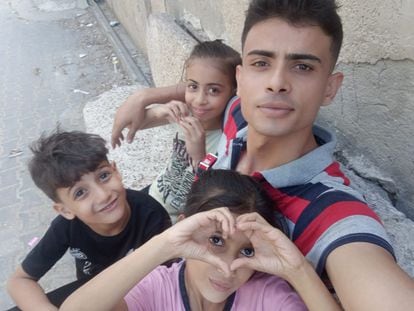Help a Palestinian escape the war in Gaza. Fundraising target: between $7,000 and $12,000
Feras #Feras

“My name is Abdallah Aljazzar, I am 24 years old and I live in Gaza. Many of us are starting to plan our departure from here to start a new life in other countries. I’m not sure where I will end up, but I know I have to get out.” Aljazzar, an English literature graduate, has never set foot outside Gaza, like much of his generation. For weeks now he has been displaced with over a million other Palestinians in Rafah, in the south of the Gaza Strip, and spends the day looking for food for his family.
Aljazzar has lost more than 30 relatives since the bombing began in October, and his house is a pile of rubble. He feels he can’t go on any longer. He estimates he needs AUD$20,000 (about $13,230) to cross the border into Egypt, spend a few weeks in Cairo, fly to Australia and live there for the first three months. “I belong to an organization of young writers in Gaza and I have a mentor who lives there, she will help me with the visa and will also give me an invitation so that it will be easier for me to be accepted by the authorities,” he explains to this newspaper by WhatsApp. For now, he has only raised just over $2,500. “I fear I have asked for too much. There is no deadline to get the money, but the war can kill me at a moment’s notice. If I manage to escape, I will be able to get the rest of my family out and we will start a new life somewhere else,” he says.
The announcement a month ago by the Israeli authorities of a ground operation in Rafah that will force the evacuation of those already displaced in the area, increasing hunger in the absence of sufficient humanitarian aid, and the desperation generated by five months of war, have caused thousands of Gazans to attempt to leave the territory at any cost. Many hope to raise the money through crowdfunding campaigns, with desperate messages in English multiplying every week.
 Abdallah Aljazzar, a 24-year-old Gazan, with his younger brothers. Cedida por Abdallah Aljazzar
Abdallah Aljazzar, a 24-year-old Gazan, with his younger brothers. Cedida por Abdallah Aljazzar
The aim is to raise the amount demanded by opaque networks of intermediaries who facilitate their passage through Rafah, the border crossing with Egypt. This is the tansiq (coordination, in Arabic), as they call the operation that consists of a criminal group bribing the authorities to ensure that a specific name is included among the 250 on the daily list of the Egyptian police at the crossing. The list has existed for years, but getting on it used to cost between $300 and $600.
Since October, the vast majority of Palestinians who had a foreign passport or sufficient purchasing power to pay the facilitators themselves have fled Gaza through Rafah. Those that remain have no other choice and — in a territory where more than 50% of the population was poor before the war — the only solution to flee Gaza now to is to resort to collections and micro-patronage.
Paying this network of intermediaries does not automatically mean passage into Egypt, but the possibility of doing so in the days to come, explain Gazans who know the system. The more you pay, the faster the process. The amount demanded depends on who you are, how much of a hurry you are in, your contacts or political leanings, and other considerations. In January, the cost ranged from $4,500 to $11,000. Today, it is between $7,000 and $12,000, according to different testimonies. Aljazzar calculates that in his case, the payment of this bribe will be around $5,000. It is the cruelty of the law of supply and demand, under the threat of an imminent military invasion, as reiterated last Thursday by Israeli Prime Minister Benjamin Netanyahu: “Whoever tells us not to operate in Rafah, is telling us to lose the war — and that will not happen.”
Another challenge is payment. The Israeli blockade of the Strip, in place since 2007, and measures to prevent Hamas from endowing itself with funds make trade with Gaza difficult. The war has done the rest. At the moment, there are endless queues at the few ATMs still operating in Rafah and in front of the Western Union offices that are still active. As a result, those who organize the collections use family and friends overseas to get the money directly or indirectly to the intermediaries in Cairo.
More money, faster
Crowdfunding platforms are flooded with cases like Aljazzar’s: a photo, a brief history of the person explaining who they are, where they are and what their aspirations are, and a rundown of the expenses they have to meet. A simple search with the word Gaza on the largest one, GoFundMe, brings up more than 500 results. Every week more are added.
Asma Aldada is 27 and has a petition on GoFundMe: “When the [Israeli ground] incursion into Rafah was announced, we understood that there was no place left for us. We don’t want to be displaced again. Just to return to our homes that we know nothing about. At the beginning of the war, I was against those who left Gaza and abandoned the link to the land and the sumud [perseverance, an important value in Palestinian nationalism], but now I am afraid for my family and the war is not going to end. We don’t want to end up in the street, that’s why I decided to start this petition,” she tells EL PAÍS via WhatsApp messages.
There are six people in her family and they sleep in a plastic tent. “When it rains, the water comes in from underneath and soaks the clothes that are on the floor,” she says. Some of them fled from their house in the capital, Gaza City, with just two changes of clothes in their bag. Aldada has gone from flying to Jordan last year to represent Palestine with her handicraft project (Gaza handmade) to surviving on humanitarian aid and what her mother is able to cook in a clay oven, for lack of gas and electricity. “We buy water to drink and to wash ourselves. We even drink salt water,” she says. She is trying to raise almost $55,000 so that the six of them can leave. So far, she has raised $390.
Her WhatsApp messages contrast with her humor on Instagram, where she simulates the videos in which celebrities and influencers summarize their day. She narrates in first person her day in Gaza: she took “daddy’s Land Rover” (a cart pulled by a donkey), to “the mall to buy Prada and Adidas” (second-hand clothes on the streets of Rafah) and “at Carrefour” (the black market) she bought onions at 50 shekels a kilo (over $14 at prices inflated by the lack of food).
 Asma Aldada, before the war, in an image provided by her.
Asma Aldada, before the war, in an image provided by her.
Aldada’s mention of the sumud refers to the dilemma posed by these initiatives: trying to save your life and that of your loved ones feeds the criminal groups that profit from desperation and turns the right to survive into a question of money, connections in foreign countries, or mastery of English. It also reinforces the Israeli far-right’s idea of a Gaza empty of Palestinians and with Jewish settlements like those evacuated in 2005. In recent months, there has been talk in Israel of “voluntary emigration,” a euphemism for forcing Palestinians to leave Gaza, without expelling them directly. The Minister of Legacy, Amichai Eliyahu, has even provoked laughter by presenting it as a way for Gazans who wish to “improve where they live” and another, Shlomo Karhi, head of Communications, has pointed out that “the war itself” will make many Gazans want to leave.
“Even when the war is over, it’s hard to imagine what life in Gaza will be like in the future,” Aljazzar says, almost apologizing for wanting to flee. In recent weeks, most of the contacts made with Gazans end up on the financial issue. The distressed people ask for help with less and less modesty and insist that their plea for crowdfunding be spread.
Like Tamer Ashraf, 20. He is seeking to raise 100,000 Swiss francs (around $114,000) through a friend in Switzerland to get 11 members of his family out. “It’s a lot, but necessary to escape this genocide, especially before the land invasion of Rafah,” he says.
Among the reasons he gives via WhatsApp for leaving, he cites treating wounds on a foot and a hand, and the foreseeable invasion of Rafah, but above all to save himself from what he considers “certain death.” “I wouldn’t leave my country and my homeland if it wasn’t the only way to survive. And to survive, you need a lot of money,” he sums up. Ashraf complains that the price to cross the border “changes every day” and can already exceed $10,000 per person.
This is also the case for Ibrahim. A medical student, he is asking for $27,000 to finish his degree overseas and since December he has raised $7,000. “I’m very tired. I wish someone I know would see my request and decide to support me with the rest of the money,” he tells this newspaper in a faltering phone call from Deir al-Balah in central Gaza.
And that of Feras Alkhateeb, who explains via Instagram direct messages that he needs “whatever it takes” to leave with his family and, at the moment, for the rented accommodation he has found in Zawaida, also in central Gaza, after having to flee his home in the capital. “The landlord is going to kick me out soon because I can’t pay him,” he laments.
Sign up for our weekly newsletter to get more English-language news coverage from EL PAÍS USA Edition